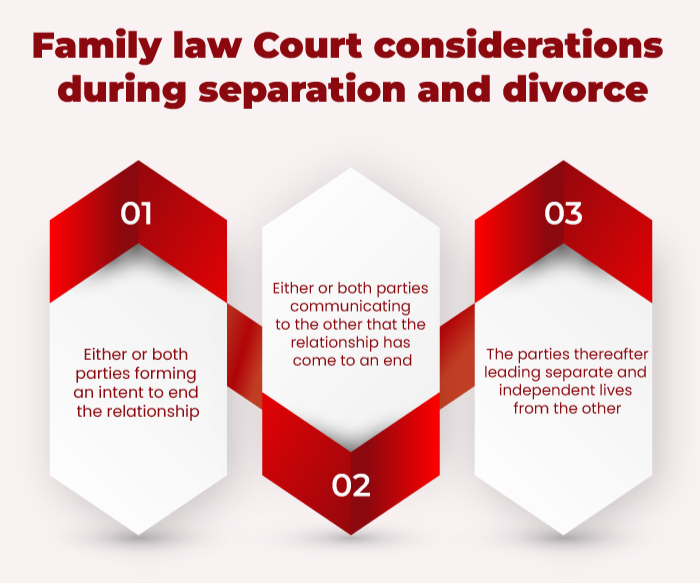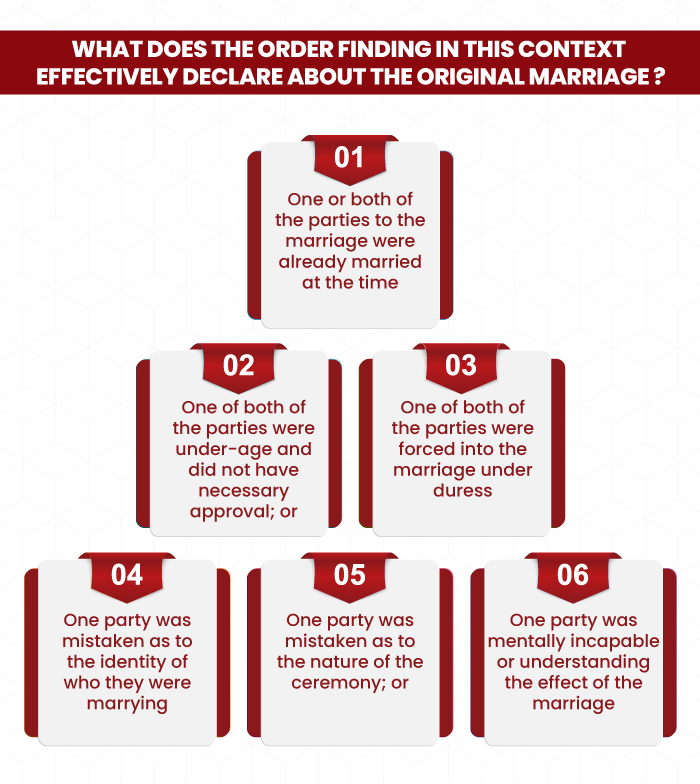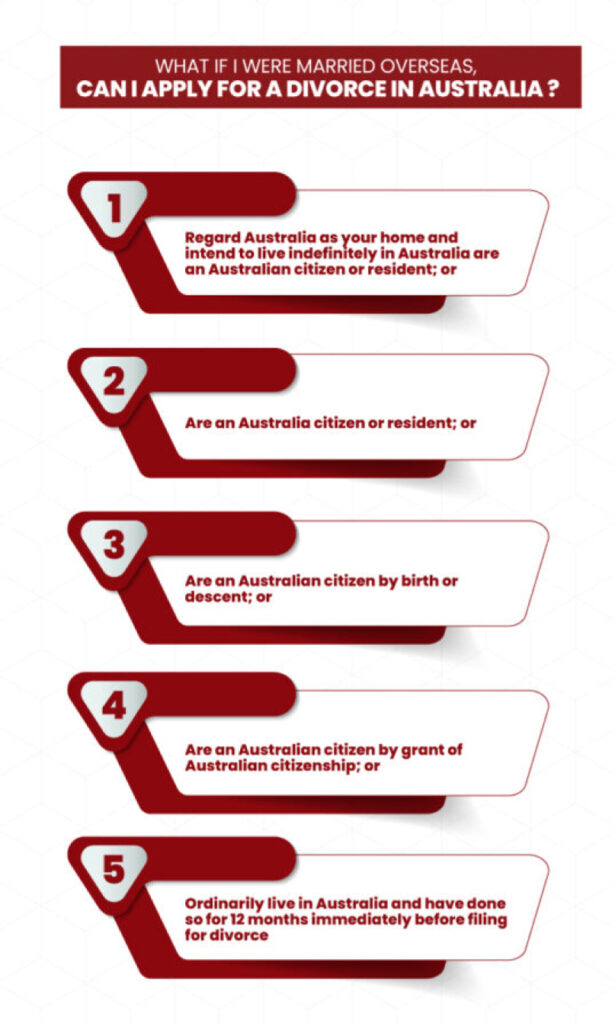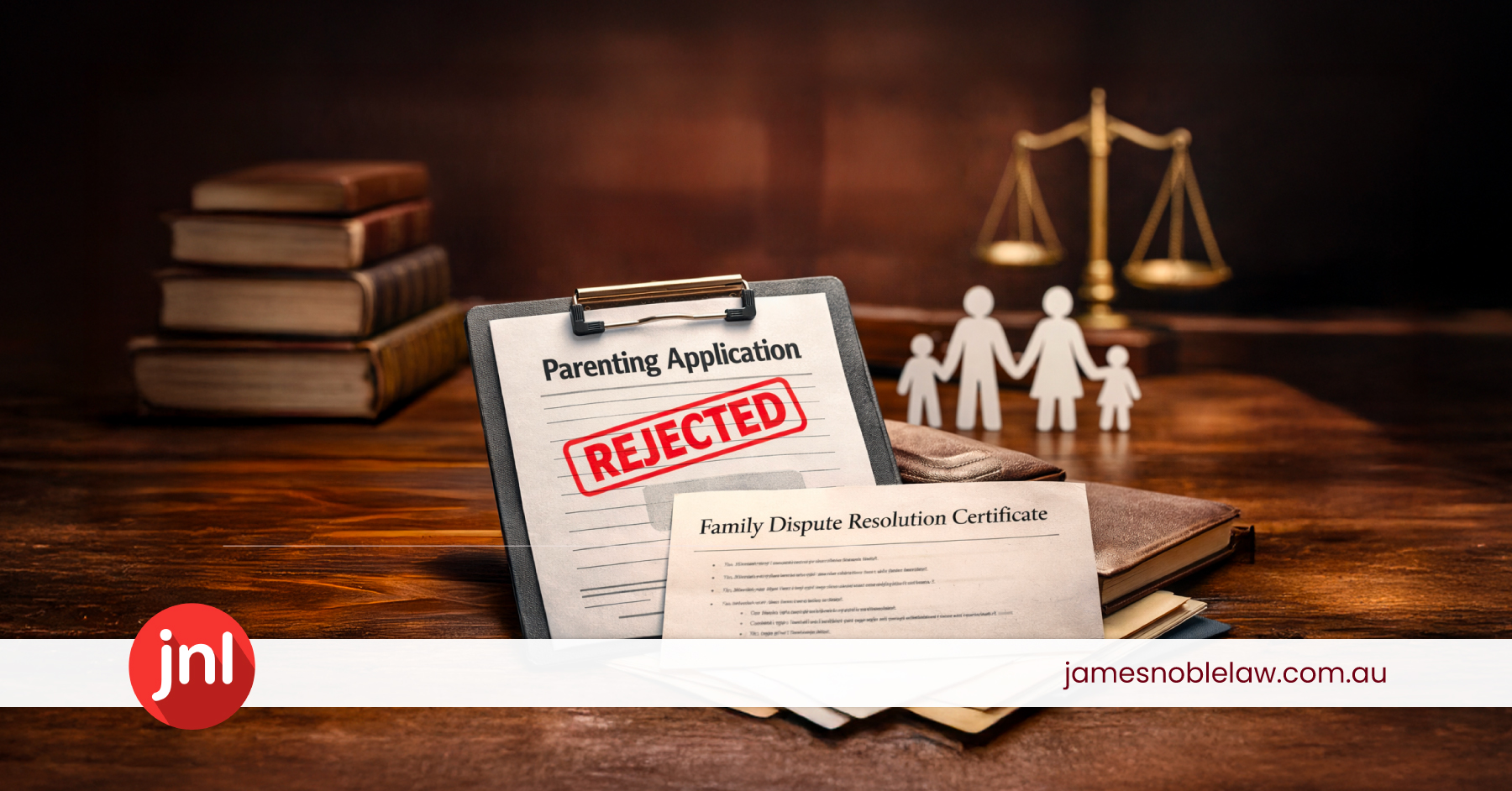When family law disputes escalate, concerns about safety, communication, and children’s wellbeing often arise quickly. Many people assume that restraining orders can only be made…

Separation and Divorce – Considerations, Procedures, legality
Separation and divorce can be highly challenging and burdensome periods in the lives of both individuals involved. Usually, the dissolution of a partnership or “separation” happens when the relationship is terminated due to the actions or behaviours of one or both parties.
Family law Court considerations during separation and divorce
 Although separation is not clearly defined under the legislation, the Federal Circuit and Family Court of Australia normally considers the effect of the following three elements:
Although separation is not clearly defined under the legislation, the Federal Circuit and Family Court of Australia normally considers the effect of the following three elements:
- Either or both parties forming an intent to end the relationship;
- Either or both parties communicating to the other that the relationship has come to an end; and
- The parties thereafter leading separate and independent lives from the other.
It is important to understand that you do not require the consent of your partner to separate from them.
Family law court considerations for Separation and Divorce
Applications for divorce are filed in the Federal Circuit Court and Family Court of Australia. For an Application for Divorce, there must be a separation between the parties of the relationship.
Under the Family Law Act 1975 (Cth), a marriage has irretrievably broken down when the Court is satisfied that a couple has lived separately and apart for at least 12 months, and, the marriage has broken down to such an extent that it is unlikely that the parties would get back together. Accordingly, the parties must have been separated for a continuous period of not less than 12 months immediately preceding the date of the filing of the application, and, satisfy the Court that there is not a reasonable likelihood of cohabitation being resumed.
Although the Court must be satisfied that the parties have lived separately and apart for at least 12 months, it is not necessary that the parties move residence. Parties may continue to reside in the same residence as the other party.
Sole Application versus Joint Application for Separation and Divorce
When applying for a divorce, you can choose to do so by yourself (sole application) or with your spouse (joint application) using the same online form.
Sole Application
It is important to understand the differences between a sole and joint application before you begin. If you opt for a sole application, you will be known as the applicant, and your spouse will be the respondent. For a sole application, only you need to sign the application, and you must arrange serve of the application on your spouse. An applicant cannot personally serve the application on the other party. Court attendance is not required if there are no children involved, but it is advisable if there are children under 18.
Joint Application
On the other hand, a joint application involves both parties being joint applicants. One party completes the application and provides a copy to the other for review and signature. Both parties must sign the application. There is no need to serve documents on the other party in a joint application, and court attendance is not required.
Whether you choose a sole or joint application, understanding the process and requirements can help make the divorce process smoother.
Cost
The cost associated with filing an Application for Divorce often changes. To ensure that we are providing you with the most up-to-date information, please contact our office:
Here is our google map location-
If You are Separated Under The Same Roof
Although the Court must confirm that the parties have been living separately and apart for at least 12 months, there is no requirement for them to change residences. It is possible for parties to continue living under the same roof. This is because physical separation is not a necessary nor sufficient condition for separation. The granting of a divorce order is based solely on the irretrievable breakdown of the relationship.
The concept of “separated under one roof” is not uncommon among married couples. This situation occurs when couples live separately while still residing in the same household. As long as the matrimonial relationship has been effectively severed according to the terms of the legislation, continuing to live together is not an impediment to filing for divorce. This arrangement is particularly common when property matters between the parties have not yet been finalised.
To satisfy the Court of these requirements, the couple must provide witness evidence or other proof that they no longer share the same bed, do household chores together, or socialise with each other. This evidence is often provided by an independent person who describes their observations of the parties’ relationship, helping the Court corroborate the statements made in the divorce application. If all aspects of common life have ceased, the parties can be considered separated.
If a divorce application has been filed and the parties reconcile, or if the Court believes there is a reasonable likelihood of them resuming cohabitation, the Court will not grant a divorce or will revoke a divorce order under section 48(3) of the Family Law Act 1975 (Cth).
The legislation allows separated couples to resume cohabitation for up to, but not including three months without affecting the prior separation period required for a divorce. If such a reconciliation occurs and the parties separate again, the period of separation before the reconciliation can be included as part of the 12-month separation period required.
Withdrawing Process of Divorce Application
The process for withdrawing a divorce application before the Court is called a Notice of Discontinuance. This document is used to halt your application, response, or notice of appeal, or to withdraw part of your case. To file a Notice of Discontinuance, you can do so via the Commonwealth Courts Portal or by visiting or emailing the registry of the Federal Circuit and Family Court of Australia.
It’s important to note that if one party files a Notice of Discontinuance, the other party can still pursue the orders they have requested, including orders for costs. Even after lodging the Notice of Discontinuance, if the next court listing for your matter is not cancelled, it is advisable to attend the event to ensure no Court Orders are made in your absence.
Married less than two (2) years
If the parties have been married for less than two years, they must first consider reconciliation, with the assistance of a family or child counsellor, before either party can file for divorce.
For marriages of less than two years, a counselling certificate is required before filing for divorce. To obtain this certificate, counselling sessions must be attended. To schedule counselling, contact the Family Relationship Advice Line (FRAL) at 07 2112 3947. If attending counselling with your spouse is not possible, you will need to file an affidavit as outlined on the Federal Circuit and Family Court of Australia website.
Children under 18 years of age
If there are children under the age of 18 from the marriage, it is crucial to provide details of their arrangements in Part F of the application. This includes housing, care arrangements if not at school, schooling details such as grade and progress, before and after school care, the children’s health status, contact with each parent, and reasons if there is no contact.
Additionally, details about financial support provided for the children should be included, with explanations if no support is provided.
A child of the marriage is defined as:
- Any child of you and your spouse, including children born before the marriage or after separation;
- Any child adopted by you and your spouse; or
- Any child who was treated as a member of your family before your final separation, such as a stepchild or foster child.
A divorce order cannot be granted if there are children under 18 from the relationship until the Court is satisfied that suitable arrangements have been made for their welfare. However, in some cases, the divorce order may be granted despite welfare considerations.
However, if there are no children of the marriage aged under 18 years, there is no requirement to attend the court hearing of the divorce from either sole or joint applications.
Same-sex marriages
The process for same sex couples in Australia is the same for all couples, regardless of sexuality or gender. A same-sex couple will need to meet the same requirements as a heterosexual couple.
Service of Application for Divorce
If you and your spouse file the application together, you are considered joint applicants and are not required to serve the other party.
However, if you file the application by yourself as the sole applicant, you must serve the Application for Divorce on the other party. For detailed instructions and a helpful video on how to serve a divorce, refer to “How do I serve a divorce” on the Federal Circuit and Family Court of Australia website.
If you are unaware of your spouse’s whereabouts, you will need to request a service order from the court.
Upon filing a divorce application with the Court, the applicant (the party who filed the application) must notify the other party that the marriage has ended. This notification can be carried out by any individual over the age of 18 or by a professional process server authorised to serve the other party. This process does not need to be completed by you personally.
The Uniform Civil Procedure Rules 1999 (Qld) outline the correct procedure for delivering the divorce application to the other party. Failure to adhere to these requirements can result in significant delays and additional procedural costs. To avoid procedural errors, many people opt to use a professional process server to serve the document.
It is crucial that the application for divorce be served directly to the other person and in person. If the other party refuses to accept the document or does not wish to acknowledge the divorce, the server may place the document in their presence and state the purpose of the document and the upcoming court hearing date.
Once proof of service is established, the server must complete a sworn affidavit detailing the time, date, and place of service in the presence of a Justice of the Peace or a solicitor. If the other party does not refuse service, they may sign an acknowledgment of service.
In some cases, one party may have difficulty accepting the breakdown of the marriage and may refuse to sign the divorce papers. Other situations may involve a controlling ex-partner or parties who believe they will reconcile. In Australia, one party cannot unduly delay or complicate divorce proceedings by refusing to sign divorce papers.
Unable to locate spouse
The Application for Divorce requires you to enter your spouse’s address for service. However, if you are unable to locate your spouse, despite taking all reasonable steps to find them, you can indicate their address as ‘unknown’. In such cases, you will need to submit an additional application requesting an order to dispense with service or for substituted service.
What if anyone fraudulently entered into a legal marriage?
 If a marriage was entered into fraudulently, an application can be made to the Court for a declaration of nullity, as outlined in the Marriage Act 1961 (Cth), which specifies the grounds for seeking such a decree.
If a marriage was entered into fraudulently, an application can be made to the Court for a declaration of nullity, as outlined in the Marriage Act 1961 (Cth), which specifies the grounds for seeking such a decree.
A decree of nullity is an order that invalidates the original marriage based on specific grounds:
1. One or both of the parties to the marriage were already married at the time;
2. One of both of the parties were under-age and did not have necessary approval; or
3. One of both of the parties were forced into the marriage under duress.
4. One party was mistaken as to the identity of who they were marrying;
5. One party was mistaken as to the nature of the ceremony; or
6. One party was mentally incapable or understanding the effect of the marriage.
The Court will not declare a marriage invalid based on grounds such as non-consummation of the marriage, never having lived together, family violence, or other incompatible situations.
To apply for a decree of nullity, you must file an Initiating Application along with an Affidavit detailing the facts relied upon to have the marriage annulled, and information about the type of marriage ceremony performed.
For Defacto relationships
If you were in a relationship with another person but were not legally married, you may still be classified as being in a de facto relationship, as outlined in Section 4AA of the Family Law Act 1975 (Cth).
To meet this criteria, the law stipulates that you and your former partner (irrespective of sex and gender) had a relationship as a couple who lived together on a genuine domestic basis.
In cases involving de facto couples, an Application for Divorce is not necessary (since there is no marriage to nullify).
However, the Federal Circuit and Family Court of Australia has jurisdiction to address financial, property, and parenting issues arising from these relationships.
Opposing an Application for Separation and Divorce
If you have been separated from your former matrimonial partner for over 12 months, there are limited grounds to oppose an Application for Divorce. You can only oppose the divorce if:
- The 12-month separation period as claimed in the application has not been met.
- The Court does not have jurisdiction over the matter.
To contest the divorce order, you must complete and file a Response to Divorce, and attend the hearing. In the response, you must specify the grounds on which you seek to have the divorce proceeding dismissed.
If you fail to attend the divorce hearing, the Court may decide to grant the divorce application in your absence. If attending court in person is challenging due to work or other circumstances (such as traveling overseas or interstate), you may request to appear electronically if the court event is being held in-person.
If there are errors in the Application for Divorce, you will need to detail these discrepancies in the Response to Divorce. Common errors may include incorrect dates of birth or other significant dates related to the relationship, inaccurate details concerning children, or misrepresentations of the circumstances of the marriage.
If you wish to file a Response, this document needs to be served on the other party within 28 days of the Application for Divorce being served upon you, or, 42 days of the application for divorce being served upon you if you were served outside of Australia.
Parenting, property and spousal maintenance matters
It is important to understand that the granting of a divorce order does not decide issues regarding property, spousal maintenance or parenting arrangements of any children.
If you wish for the Court to make orders regarding these issues, you can:
- Come to an agreement and file an Application for Consent Orders with the Court; or
- In circumstances where no agreement can be reached, initiate the litigation process.
Plans to re-marry in the near future
If you are planning on re-marrying in the near future, you should avoid making set plans until the divorce order has been finalised.
However, you may complete and lodge a Notice of Intended Marriage with an authorised celebrant before a divorce order is finalised. This process must occur one month prior to the date the marriage is to be solemnised. You will require the authorised celebrant to sight a copy of the divorce order before the wedding can take place.
Usually, a divorce order takes affect one month and one day after the divorce is granted by the Court. Accordingly, you should not assume the divorce will be granted at the first Court hearing.
What If I were married overseas, can I apply for a divorce in Australia?
 If you were married overseas, you can apply for a divorce in Australia if you or your spouse:
If you were married overseas, you can apply for a divorce in Australia if you or your spouse:
- Consider Australia your home and intend to live in Australia indefinitely;
- Are an Australian citizen or resident;
- Are an Australian citizen by birth or descent;
- Are an Australian citizen by grant of Australian citizenship; or
- Normally live in Australia and have done so for at least 12 months immediately before filing for divorce.
You must provide the Court with a copy of your marriage certificate. If the certificate is not in English, you need to submit an English translation along with an Affidavit from the translator. Parties married overseas can apply for a divorce in Australia as long as one of them meets the eligibility criteria, and the marriage was solemnised overseas according to the laws of that country, and a marriage certificate was issued.
Living overseas
If you are residing overseas, you may still qualify to seek a divorce in Australia. However, the Court can only grant a divorce if you or your spouse meet the eligibility requirements.
If neither you nor your spouse meet these criteria, you cannot apply for a divorce in Australia. In such cases, you should contact the relevant authorities in the country where you are currently located.
If you are eligible to apply for a divorce in Australia but are residing overseas, you must provide an Australian address in question 10 of the application.
For joint applications, both parties must provide an Australian address. This address can belong to a family member or friend who is willing to receive and forward any served documents. Your overseas address can be entered in question 9.
As the dissolution of a marriage is typically the entrance point of many other family law issues such as division of property and assets, parenting arrangements and consent orders, please seek legal advice on your situation and how to proceed.
Seeking legal support?
Look no further than James Noble Law! We are your trusted Family Law experts, providing Family law Services in Brisbane, Family Mediation services in Cairns, and Family law Service in Milton. Avail yourself of a complimentary 20-minute consultation with our adept legal team – no obligations whatsoever! Book your appointment now to engage with our experienced Family Lawyers.
If you require legal advice, please contact one of our accredited family law specialists on 07 2112 3947 or email us at team@jamesnoblelaw.com.au.
Discover:
🌟 Accomplished Brisbane Family Lawyers. 🌟 Devoted Cairns Family Lawyers. 🌟 Proficient Milton Family Lawyers.
Easily locate us on Google Maps and take the proactive step towards resolving your legal matters. Seize this opportunity for guidance from our seasoned professionals. Act today and set the course for legal clarity and confidence!
Helpful Family Law Documents & Guides
- A Guide to Children Negotiation and Family Law
- A Guide to Property & Family Law Act Paper
- A Guide to Alternative Dispute Resolutions
- A Guide to Preparing for the unthinkable
- A Guide to Collaborative Practice Paper
- A Guide to Separation in Family Law
- A Guide to Family Law Property
- A Guide to Dispute Resolution
- A-Z Collaborative Law eBook
- A Guide to Separation
- A Guide to Children
- Arbitration eBook
Need Help?
Talk to a Noble Family Lawyer
Family Law News
Keep up to date and receive clarity on a range of news related articles on the James Noble Law blog.


Filing an Initiating Application for parenting orders can feel urgent and overwhelming especially when children are involved. However, many parents are surprised to learn that…

Artificial intelligence (AI) tools are increasingly being used across professional services, including the legal profession. From drafting submissions to summarising case law and preparing chronologies,…



